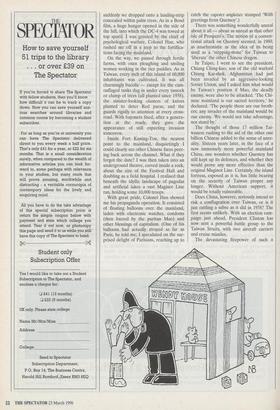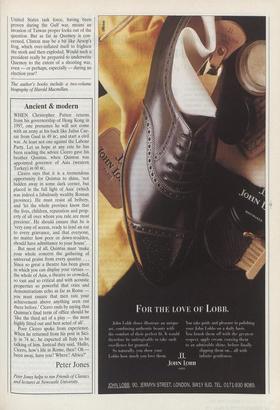THE ISLAND THAT IS REALLY IN DANGER
Alistair Home says that, paradoxically,
Clinton might well save Taiwan, but not somewhere much smaller offshore
SURPRISINGLY, over the past days of crisis in the Taiwan Straits, the world media seems to have neglected what could be the real danger spot — the offshore island of Quemoy. Little over a mile from the mainland and only 12 miles long by nine wide, Quemoy (and its sister island- Matsu) were always claimed by Mao to be within China's territorial waters. The cur- rent Chinese manoeuvres have been taking place, menacingly, with live ammunition, just 32 miles away.
In August 1958, the Communists unleashed a devastating, months-long artillery bombardment of Quemoy. It pro- voked the American Secretary of State, John Foster Dulles, to one of his more alarming acts of brinkmanship, threatening the use of nuclear weapons if China invad- ed. Macmillan, then Prime Minister, recoiled with alarm, recording in his diaries: 'This may lead Russia to join in. We may thus be on the brink of world war three.' He urged that the tiny islands be demilitarised — without receiving any encouraging feedback from either Wash- ington or Peking.
Then suddenly China's Marshal Peng announced that the bombardment would continue only on the odd days of the month. Macmillan remarked that this was `rather like parking alternately on differ- ent sides of the street'. In March the fol- lowing year, the bombardment ceased as suddenly as it had begun, without any explanation. Perhaps the Communists had simply run out of ammunition. Macmillan remained mystified by what he called a `Chinese puzzle'.
Just 16 years ago, I visited Quemoy as a guest of the Taiwanese General Staff (recorded in The Spectator, 19 August 1980). Although the serious shelling had long since ceased, except for a token round on odd days, my hosts were taking no chances and selected an even day just in case 'honourable friend' might be hit on the head by a missile stuffed with pamphlets. Ritualistically, the ancient DC- 4 skipped in at 50 feet above the waves, 200 miles from Taipei — to dodge under the Communist radar screen, they explained.
The plane was stuffed with soldiers in full battledress, crammed on to litters round the hull as if ready for an airborne drop. Out of the blue haze, the first sight of Quemoy reminded me of Prospero's island. But the brilliant white sands ringing it seemed totally deserted. Then I noticed the double rows of anti-landing-craft rails, barbed wire and (presumably) hidden minefields. In the near distance, the coast of the mainland was mistily visible, folding round Quemoy just like an open hand.
There was no sign of an airfield, until suddenly we dropped onto a landing-strip concealed within palm trees. As in a Bond film, a huge hangar opened in the side of the hill, into which the DC-4 was towed at top speed. I was greeted by the chief of psychological warfare, Colonel Han, who rushed me off in a jeep to the fortifica- tions facing the mainland.
On the way, we passed through fertile farms, with oxen ploughing and smiling women working in the rice paddies. As in Taiwan, every inch of this island of 60,000 inhabitants was cultivated. It was all charmingly bucolic — except for the cam- ouflaged tanks dug in under every tussock or clump of trees (all planted since 1958), the sinister-looking clusters of knives planted to deter Red paras, and the guards rigidly to attention at every cross- road. With bayonets fixed, after a genera- tion at the ready, they gave the appearance of still expecting invasion tomorrow.
Inside Fort Kuning-Tou, the nearest point to the mainland, disquietingly I could clearly see other Chinese faces peer- ing back across the channel. What if they forgot the date? I was then taken into an underground theatre, carved inside a rock, about the size of the Festival Hall and doubling as a field hospital. I realised that beneath the idyllic landscape of pagodas and artificial lakes a vast Maginot Line ran, holding some 10,000 troops.
With great pride, Colonel Han showed me his propaganda operation. It consisted of floating balloons over the mainland, laden with electronic watches, condoms (then barred by the puritan Mao) and other blessings of capitalism. (One of his balloons had actually strayed as far as Paris, he told me; I speculated on the sur- prised delight of Parisians, reaching up to catch the capotes anglaises stamped 'With greetings from Quemoy'.) There was something wonderfully unreal about it all — about as unreal as that other isle of Prospero's. The notion of a conven- tional attack on Quemoy seemed, in 1980, as anachronistic as the idea of its being used as a 'stepping-stone' for Taiwan to `liberate' the other Chinese dragon.
In Taipei, I went to see the president, Chiang Ching-kuo, son of the old warlord Chiang Kai-shek. Afghanistan had just been invaded by an aggressive-looking Soviet Union, and I asked him what would be Taiwan's position if Mao, the deadly enemy, were also to be attacked. 'The Chi- nese mainland is our sacred territory,' he declared. 'The people there are our broth- ers; any invader of the mainland would be our enemy. We would not take advantage, nor stand by.'
The thought of those 17 million Tai- wanese rushing to the aid of the other one billion Chinese added to the sense of unre- ality. Sixteen years later, in the face of a now immensely more powerful mainland China, one wonders whether Quemoy has still kept up its defences, and whether they would prove any more effective than the original Maginot Line. Certainly, the island fortress, exposed as it is, has little bearing on the security of Taiwan proper any longer. Without American support, it would be totally vulnerable.
Does China, however, seriously intend to risk a conflagration over Taiwan, or is it just rattling a sabre as it did in 1958? The first seems unlikely. With an election cam- paign just ahead, President Clinton has now sent a powerful battle group to the Taiwan Straits, with two aircraft carriers and cruise missiles.
The devastating firepower of such a United States task force, having been proven during the Gulf war, means an invasion of Taiwan proper looks out of the question. But as far as Quemoy is con- cerned, Clinton may be a bit like Aesop's frog, which over-inflated itself to frighten the stork and then exploded. Would such a president really be prepared to underwrite Quemoy to the extent of a shooting war, even — or perhaps, especially — during an election year?
The author's books include a two-volume biography of Harold Macmillan.




































































 Previous page
Previous page